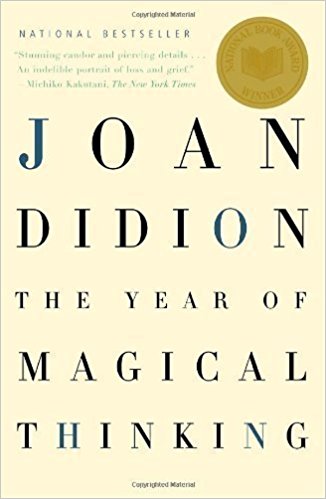Summary | Excerpt | Reading Guide | Reviews | Beyond the Book | Readalikes | Genres & Themes | Author Bio

José. Who was part of our household. Who was supposed to be flying to Las Vegas later that day, December 31, but never went. José was crying that morning as he cleaned up the blood. When I first told him what had happened he had not understood. Clearly I was not the ideal teller of this story, something about my version had been at once too offhand and too elliptical, something in my tone had failed to convey the central fact in the situation (I would encounter the same failure later when I had to tell Quintana), but by the time José saw the blood he understood.
I had picked up the abandoned syringes and ECG electrodes before he came in that morning but I could not face the blood.
In outline.
It is now, as I begin to write this, the afternoon of October 4, 2004.
Nine months and five days ago, at approximately nine o'clock on the evening of December 30, 2003, my husband, John Gregory Dunne, appeared to (or did) experience, at the table where he and I had just sat down to dinner in the living room of our apartment in New York, a sudden massive coronary event that caused his death. Our only child, Quintana, had been for the previous five nights unconscious in an intensive care unit at Beth Israel Medical
Center's Singer Division, at that time a hospital on East End Avenue (it closed in August 2004) more commonly known as
"Beth Israel North" or "the old Doctors' Hospital," where what had seemed a case of December flu sufficiently severe to take her to an emergency room on Christmas morning had exploded into pneumonia and septic shock. This is my attempt to make sense of the period that followed, weeks and then months that cut loose any fixed idea I had ever had about death, about illness, about probability and luck, about good fortune and bad, about marriage and children and memory, about grief, about the ways in which people do and do not deal with the fact that life ends, about the shallowness of sanity, about life itself. I have been a writer my entire life. As a writer, even as a child, long before what I wrote began to be published, I developed a sense that meaning itself was resident in the rhythms of words and sentences and paragraphs, a technique for withholding whatever it was I thought or believed behind an increasingly impenetrable polish. The way I write is who I am, or have become, yet this is a case in which I wish I had instead of words and their rhythms a cutting room, equipped with an Avid, a digital editing system on which I could touch a key and collapse the sequence of time, show you simultaneously all the frames of memory that come to me now, let you pick the takes, the marginally different expressions, the variant readings of the same lines. This is a case in which I need more than words to find the meaning. This is a case in which I need whatever it is I think or believe to be penetrable, if only for myself.
2.
December 30, 2003, a Tuesday.
We had seen Quintana in the sixth-floor ICU at Beth Israel North.
We had come home.
We had discussed whether to go out for dinner or eat in.
I said I would build a fire, we could eat in.
I built the fire, I started dinner, I asked John if he wanted a drink.
I got him a Scotch and gave it to him in the living room, where he was reading in the chair by the fire where he habitually sat.
The book he was reading was by David Fromkin, a bound galley of Europe's Last Summer: Who Started the Great War in 1914?
I finished getting dinner, I set the table in the living room where, when we were home alone, we could eat within sight of the fire. I find myself stressing the fire because fires were important to us. I grew up in California, John and I lived there together for twenty-four years, in California we heated our houses by building fires. We built fires even on summer evenings, because the fog came in. Fires said we were home, we had drawn the circle, we were safe through the night. I lit the candles. John asked for a second drink before sitting down. I gave it to him. We sat down. My attention was on mixing the salad.
Excerpted from The Year of Magical Thinking by Joan Didion Copyright © 2005 by Joan Didion. Excerpted by permission of Knopf, a division of Random House, Inc. All rights reserved. No part of this excerpt may be reproduced or reprinted without permission in writing from the publisher.




The longest journey of any person is the journey inward
Click Here to find out who said this, as well as discovering other famous literary quotes!
Your guide toexceptional books
BookBrowse seeks out and recommends the best in contemporary fiction and nonfiction—books that not only engage and entertain but also deepen our understanding of ourselves and the world around us.